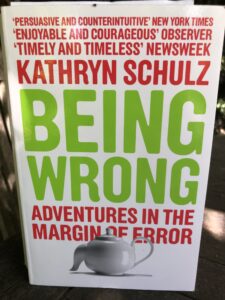”To err is to wander, and wandering is the way we discover the world; and, lost in thought, it is also the way we discover ourselves. Being right might be gratifying, but in the end it is static, a mere statement. Being wrong is hard and humbling, and sometimes even dangerous, but in the end it is a journey, and a story. Who really wants to stay home and be right when you can don your armor, spring up on your steed and go forth to explore the world? True, you might get lost along the way, get stranded in a swamp, have a scare at the edge of a cliff; thieves might steal your gold, brigands might imprison you in a cave, sorcerers might turn you into a toad–but what of that? To fuck up is to find adventure: it is in that spirit that this book is written.”
Being wrong: Adventures in the margin of error by Kathryn Schulz, is a book I was gifted, by someone I think knew just how much I would appreciate it. And I must say, I did. I do. Because this is definitely a book to read again, now and again.
”…our beliefs are inextricable from our identities. That’s one reason why being wrong can so easily wound our sense of self.”
 Having lived at least 35+ years of my life with a very hard-formed belief that my worth, my value, lay in me being correct, I guess you can fathom how I feared being wrong.
Having lived at least 35+ years of my life with a very hard-formed belief that my worth, my value, lay in me being correct, I guess you can fathom how I feared being wrong.
Oh.
How. I. Feared.
Being. Wrong.
And it’s still not easy.
To ’fess up to. To acknowledge. To own.
But I’ve gotten much better at it.
Practice makes perfect… as the saying goes.
(Can one be perfect in getting things wrong?)
”The very word ’believe’ comes from an Old English verb meaning ’to hold dear’, which suggests, correctly, that have a habit of falling in love with our beliefs once we’ve formed them.”
I was not just enamored in my beliefs, I was enamored in being right, correct, spot-on, in anything. I’d much rather not answer a Trivial Pursuit question where I dithered than answer it and be proven wrong.
”This is the thing about fully experiencing wrongness. It strips us of all our theories, including our theories about ourselves. This isn’t fun while it’s happening–it leaves us feeling flayed, laid bare to the bone and the world–but it does make possible that rarest of occurrences: real change.”
Perhaps that is precisely what I did, way back then when I was about to become a mother, and my world fell apart around me? Experienced my wrongness completely, having all my theories about myself, my marriage, my life, taking a proper tumble, leaving me laid bare to the bone… open to the question which got me started on the path to real change: Do I like who I am?
The book I am blogging about is part of the book-reading challenge I’ve set for myself during 2020, to read and blog monthly about 12 Swedish and 12 English books, books that I already own.
A book to put on my to read-list. And yes, you can be perfect, maybe not in getting things wrong, but in how to face that you’ve gotten things wrong. What that perfect is though, is not up to an external golden standard, I believe (very firmly :)) but needs to correlate to our own individual values and approaches to life, living and learning.
I also found this book helpful in supporting my awareness of this very common problem. I really think it is a cultural problem that many of us get “taught” by our cultures. Love your self-honesty and self-awareness of the know-it-all problem.